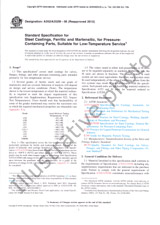We need your consent to use the individual data so that you can see information about your interests, among other things. Click "OK" to give your consent.
ASTM C1735-17(2021)
Standard Test Method for Measuring the Time Dependent Modulus of Sealants Using Stress Relaxation
Translate name
STANDARD published on 1.5.2021
The information about the standard:
Designation standards: ASTM C1735-17(2021)
Publication date standards: 1.5.2021
SKU: NS-1024137
The number of pages: 4
Approximate weight : 12 g (0.03 lbs)
Country: American technical standard
Category: Technical standards ASTM
The category - similar standards:
Annotation of standard text ASTM C1735-17(2021) :
Keywords:
elastomeric joint sealant, environmental attack, Hockman cycle, modulus, Mullins effect, stress relaxation,, ICS Number Code 91.100.50 (Binders. Sealing materials)
Additional information
| Significance and Use | ||||||||||||
|
5.1?The intent of this test method is to determine the time dependence of modulus in building joint sealants using two loading-unloading cycles to identify and mitigate any Mullins effect, and followed by a stress relaxation procedure to determine the time dependent modulus. 5.2?This test method has found applications in screening the performance of building joint sealants since the modulus is one indicator of the ability of elastomeric building sealant to withstand environmental induced movements. |
||||||||||||
| 1. Scope | ||||||||||||
|
1.1?This test method covers a procedure for measuring the time dependence of modulus in elastomeric joint sealants in a test specimen configuration described in Test Method C719. These sealant materials are typified by highly filled rubber materials. Any Mullins effect is first assessed and mitigated in two loading-unloading cycles. Time dependence of modulus in materials is then determined using a stress relaxation procedure. 1.2?The values stated in SI units are to be regarded as standard. The values given in parentheses after SI units are provided for information only and are not considered standard. 1.3?This standard does not purport to address all of the safety concerns, if any, associated with its use. It is the responsibility of the user of this standard to establish appropriate safety, health, and environmental practices and determine the applicability of regulatory limitations prior to use. 1.4?This international standard was developed in accordance with internationally recognized principles on standardization established in the Decision on Principles for the Development of International Standards, Guides and Recommendations issued by the World Trade Organization Technical Barriers to Trade (TBT) Committee. |
||||||||||||
| 2. Referenced Documents | ||||||||||||
|
We recommend:
Updating of laws
Do you want to be sure about the validity of used regulations?
We offer you a solution so that you could use valid and updated legislative regulations.
Would you like to get more information? Look at this page.




 Cookies
Cookies
